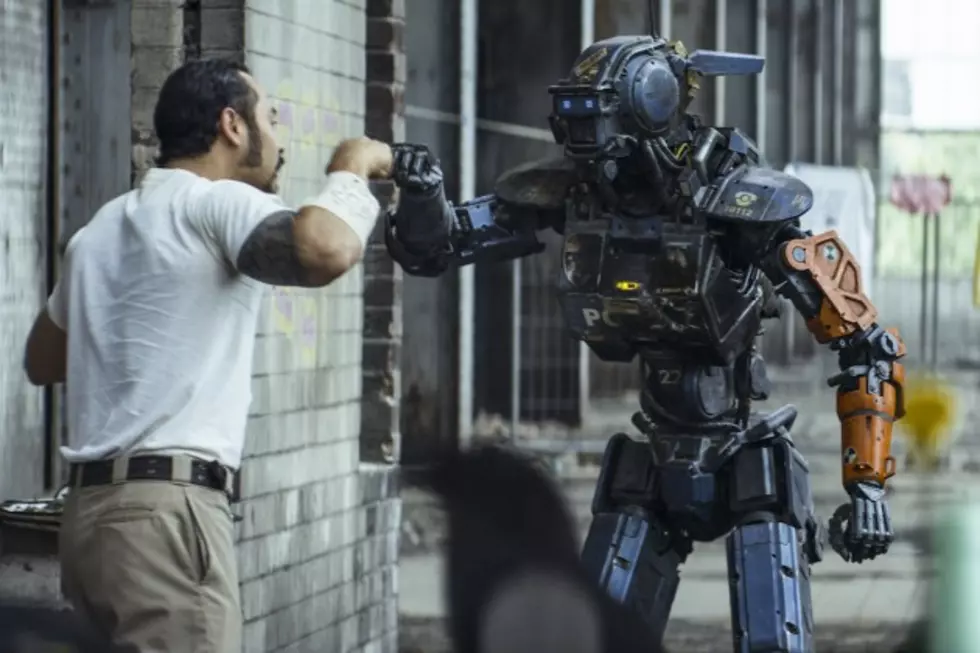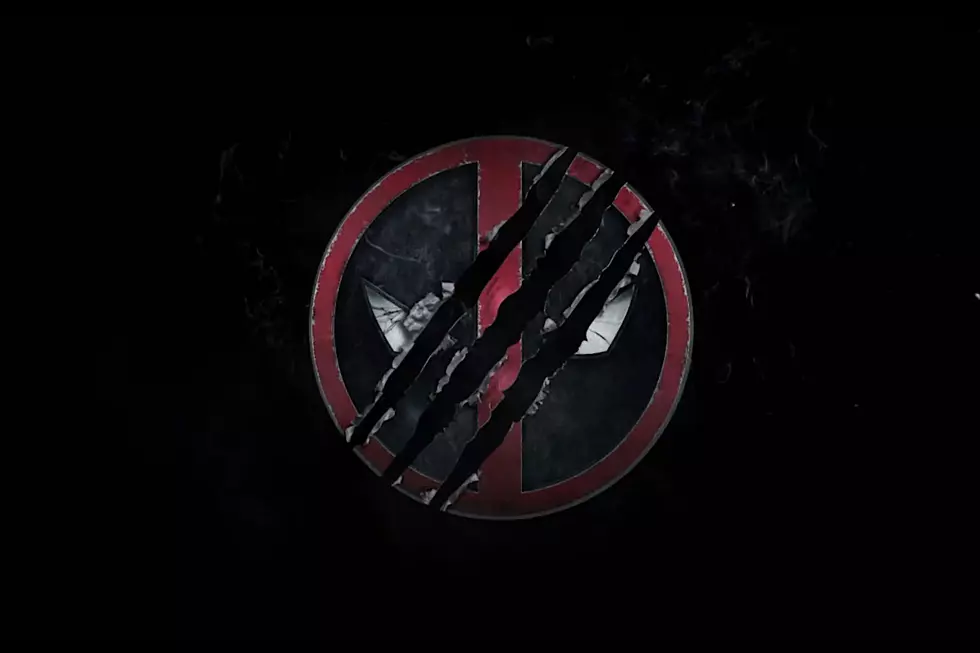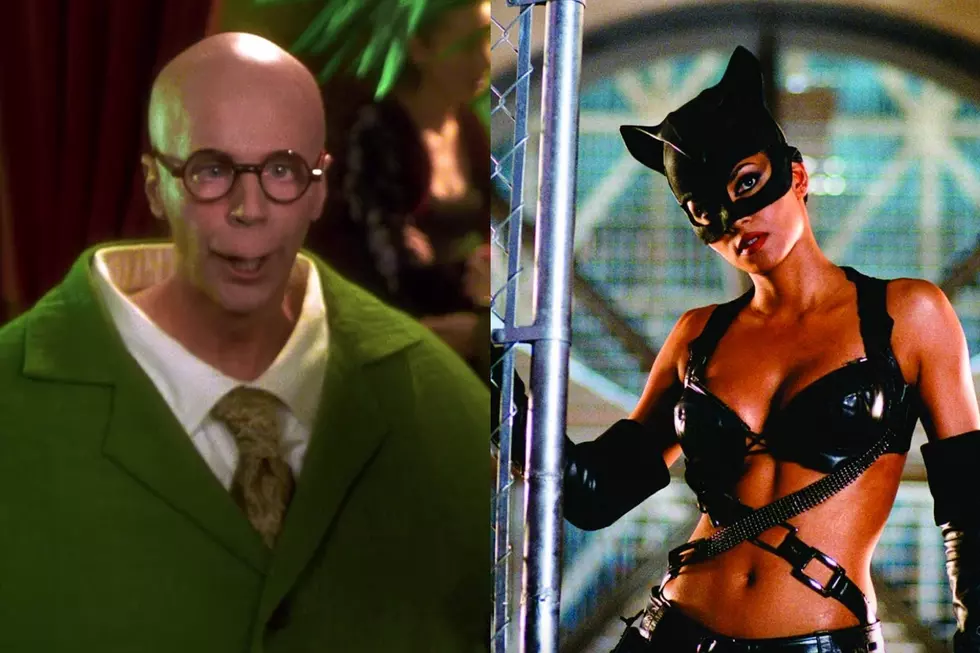
‘Chappie’ Review: Highly Artificial, Limited Intelligence
The technology in Neil Blomkamp’s movies is so fully realized and intricately detailed that it feels like another one of his characters. Now Blomkamp’s made Chappie, a film where that’s literally true in the form of a police robot given the gift of human consciousness. The result is one giant metaphor for itself; a story of the world’s first true artificial intelligence and how it is almost corrupted by violence, presented in a movie where any semblance of serious consideration of what it means to be alive is drowned out by gunfire, explosions, and macho posing.
Its not-too-distant-future world is Blomkamp’s hometown of Johannesburg in the year 2016, where a tech company invents a new robotic police force. The name RoboCop was already taken, so they call their drone army “Scouts.” Within months, the crime rate in Joburg plummets, but the Scouts’ inventor, Deon Wilson (Dev Patel), remains unsatisfied. The Scouts operate according to a rigid program; they don’t make decisions, they follow orders. He wants to make a robot that can feel, or paint, or think for itself. He creates a consciousness program, and on the day he steals a decommissioned Scout from his office in order to upload the program into its CPU, he, the robot, and the program are all kidnapped by a gang of criminals, who want to use the drone to help them rob banks.
These criminals are played by the members of the South African hip-hop group Die Antwoord, Watkin Tudor Jones (a.k.a. “Ninja”) and Yolandi Visser. Based on my limited knowledge of the band, they seem to be playing themselves if they were bank robbers (and terrible actors) instead of musicians. When Deon actives the robot Yolandi dubs Chappie, he is “born” with the intelligence of a child. He can’t speak and doesn’t understand the world. Deon tries to teach him the basics — reading, art — but Ninja wants him to become a “proper gangsta” and is only interested in schooling him in the ways of the underworld, and before long he’s tossing ninja stars, wielding nunchucks, and taking part in armed robberies.
Deon wants to merge computers and art, and so does Blomkamp; he’s crafted a digital creation so believable that audiences feel for him the same way they would for a human character. On that front at least, he is largely successful. Chappie is an enormously impressive visual effect; he interacts flawlessly with his environment and the human cast and his expressive facial features — particularly antennae that raise and lower like dogs’ ears — convey enormous amounts of sweetness and innocence.
But just as the character of Chappie is torn between his “maker”’s love of creativity and his obnoxious “Daddy”’s desire to turn him into a weapon of mass destruction, the film Chappie is split right down the middle as well. For every scene that really interrogates what life would be like for a being like Chappie there are three more that use him as the butt of cheap jokes or as the vehicle for excessively gory shootouts. The film is so thoroughly torn between two incompatible impulses — and Chappie’s various role models battle so intensely over the “right way” to parent him — that I almost want to credit Blomkamp for devising a way to externalize his own competing urges as a filmmaker who generates big, bold sci-fi ideas that inevitably devolve into shallow spectacles of violence.
I would be more inclined to give Blomkamp the benefit of the doubt if he didn’t turn his smart ideas into such dumb movies. No human being on Earth would behave like Deon's incompetent boss (Sigourney Weaver) or his jealous, aggressive rival (Hugh Jackman). At one point, Jackman’s character threatens Deon with a gun in full view of the rest of the office — he literally shoves him down on his desk and sticks a pistol to his temple — and receives no apparent punishment or discipline. Admittedly, I haven’t spent a ton of time working for tech conglomerates, but as I understand it, pointing weapons at co-workers is generally frowned upon. Then again this is the far-flung future of 2016. Maybe next year people will really loosen up about the whole threatening to murder colleagues thing.
The security at this factory — the single most advanced robotics manufacturer on the planet — is hilariously deficient. Characters walk in and out with proprietary hardware and robot parts and security doesn’t bat an eye. The most valuable computer chip in existence goes missing and no one even notices for several days, and then when they do they call Deon, they just tell him to return it by the end of the day. Not “You’re not authorized to do that, you’re fired.” Not “Bring it back immediately.” Not “Stay where you are, a security team is coming to find you.” No, they politely request he return it eventually, trust that he will, and then hang up.
Perhaps Blomkamp made his flesh-and-blood characters so venal, greedy, and stupid to provide a counterpoint to Chappie. But that still left him with a movie full of venal, greedy, stupid characters. There’s some good stuff in Chappie — mostly Chappie himself, who’s voiced and motion-captured by Sharlto Copley. But Blomkamp’s a far better observer of technological behavior than he is of the human kind; he understands design, but not designers. If nothing else, one does leave Chappie pondering the purity of artificial intelligence and the imperfections of man. If only robots could make movies too.
RATING:
More From Mix 93.1










